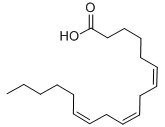EPA, DHA, and GLA fight acne
Supplements with the unsaturated fatty acids GLA, DHA and EPA cannot completely reduce acne, but can significantly reduce it. South Korean dermatologists from Seoul National University came to this conclusion in a human study that lasted 10 weeks.Study
The Koreans divided 45 subjects with acne into 3 groups. The subjects in the first group received a placebo every day for 10 weeks.
A second group took 2 capsules with borage oil every day. Each capsule contained 1 gram of borage oil, which was good for 200 milligrams of gamma linoleic acid [GLA]. In total, these subjects therefore took 400 milligrams of GLA per day.
GLA is an omega-6 fatty acid, which can convert into anti-inflammatory substances. GLA can also convert to the fatty acid arachidonic acid, which can convert into inflammatory substances, but the enzymes needed for this conversion are not active in the skin.
A third group took 2 capsules with concentrated fish oil every day. Each capsule contained 500 milligrams of the omega-3 fatty acid DHA and 500 milligrams of the omega-3 fatty acid EPA.DHA and EPA can reduce the production of inflammatory factors. Supplementation with DHA and EPA means that the enzymes, which normally convert arachidonic acid in the body into inflammatory factors, cannot function properly. Rather than converting arachidonic acid, they convert DHA and EPA into factors that don't promote inflammation.
Sponsor
The research was not funded by the supplement industry, but by the South Korean government and the university of researchers.
Results
During the supplementation period, the subjects' acne improved in the experimental groups, two dermatologists who reviewed photos of the subjects' skin concluded. In the placebo group, the skin condition remained unchanged.


The subjects themselves felt the same way, the figure above shows. In it, the acne as it was when the administration of the supplements started, is at 10.
Conclusion
"Omega-3 fatty acid and GLA supplementation at the moderate doses used were found to be both tolerable and safe, and offer a suitable adjuvant treatment scheme for mild to moderate acne vulgaris", the Koreans conclude.
Source:
Acta Derm Venereol. 2014 Sep;94(5):521-5.

|

|
The Koreans divided 45 subjects with acne into 3 groups. The subjects in the first group received a placebo every day for 10 weeks.
A second group took 2 capsules with borage oil every day. Each capsule contained 1 gram of borage oil, which was good for 200 milligrams of gamma linoleic acid [GLA]. In total, these subjects therefore took 400 milligrams of GLA per day.
GLA is an omega-6 fatty acid, which can convert into anti-inflammatory substances. GLA can also convert to the fatty acid arachidonic acid, which can convert into inflammatory substances, but the enzymes needed for this conversion are not active in the skin.
Sponsor
The research was not funded by the supplement industry, but by the South Korean government and the university of researchers.
Results
During the supplementation period, the subjects' acne improved in the experimental groups, two dermatologists who reviewed photos of the subjects' skin concluded. In the placebo group, the skin condition remained unchanged.


The subjects themselves felt the same way, the figure above shows. In it, the acne as it was when the administration of the supplements started, is at 10.
Conclusion
"Omega-3 fatty acid and GLA supplementation at the moderate doses used were found to be both tolerable and safe, and offer a suitable adjuvant treatment scheme for mild to moderate acne vulgaris", the Koreans conclude.
Source:
Acta Derm Venereol. 2014 Sep;94(5):521-5.


